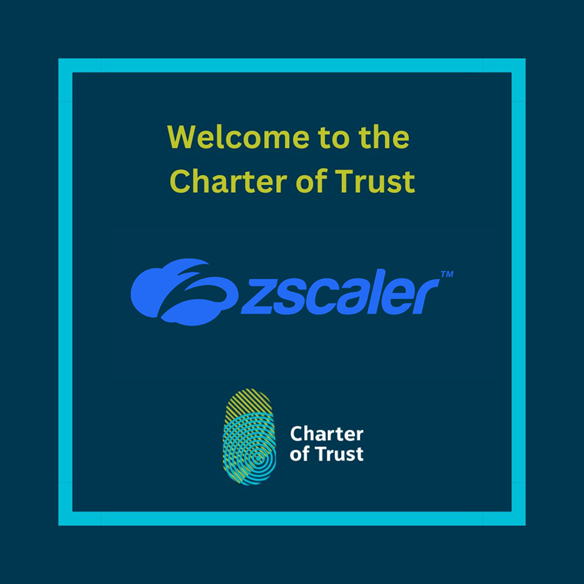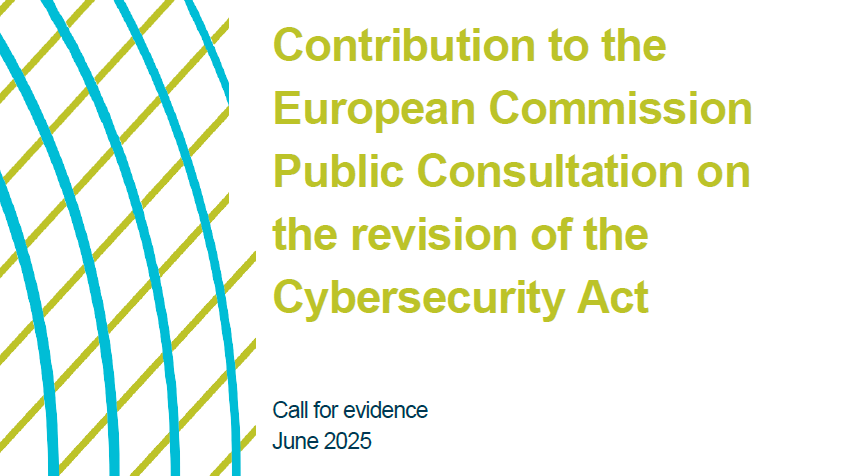Siemens, and the eight founding Charter of Trust members, today welcomed The AES Corporation, Atos and Enel to its global cybersecurity initiative at the 2018 CERAWeek® conference in Houston, TX. With America's energy hub as its backdrop, cybersecurity is a leading topic of conversation at the conference, as energy is the most attacked segment within U.S. critical infrastructure.
In 2017, the U.S. Department of Energy reported that America’s electricity infrastructure was in “imminent danger” from cyberattacks that are “growing more frequent and sophisticated.” And, according to a recent report from the Council of Economic Advisors, malicious cyber activity against government and industry cost the U.S. economy between $57 billion and $109 billion in 2016 – approximately one-half of U.S. GDP.
The Charter of Trust represents an unprecedented cybersecurity initiative that establishes three primary goals: to protect the data of individuals and businesses; to prevent harm to people, businesses, and infrastructure; and to establish a reliable basis where confidence in a networked, digital world can take root and grow.
The Charter of Trust was announced at the Munich Security Conference (MSC) in February, and signed by a group of founding companies, including Airbus, Allianz, Daimler Group, IBM, MSC, NXP, SGS and Deutsche Telekom, who called for binding rules and standards to ensure greater digital security and integrity in both the public and private sectors.
“Cybersecurity is the most important security issue of our time,” said Joe Kaeser, CEO, Siemens AG. “Siemens is working with key partners in industry, government and society to promote the Charter of Trust to make our digital world more secure. The transformational opportunities that exist for society and industry can only be realized if we all have confidence in, and can rely on the security of our data and connected systems.”
As the number of cyberattacks worldwide continues to grow, the hardware and software that control critical infrastructure like electricity and gas have become high-value targets. A study of the U.S. oil and gas industry by Ponemon Institute found that operational technology (OT) cyberattacks now comprise 30 percent of all attacks in the U.S. oil and gas industry.
“Protecting our nation’s energy infrastructure is critical to maintaining so much of the American way of life,” said Senate Energy and Natural Resources Committee Chairman Lisa Murkowski, R-Alaska. “It is great to see companies coming together to build trust and strengthen collaborative efforts to protect critical assets in our nation and around the world. Cybersecurity is a shared responsibility that requires partners at all levels of government and the private sector to address threats and sharpen responses to cyberattacks.”
The new Charter of Trust members include The AES Corporation, a Fortune 200 global power company providing energy distribution and generation in 15 countries; Atos, a global leader in digital transformation operating in 72 countries and supporting clients across various business sectors, including energy and utilities; and Enel, Europe’s largest power company for market capitalization, operating in more than 30 countries across five continents.
The Charter outlines ten principles to ensure companies and governments are taking action to address cybersecurity at the highest levels through a dedicated cybersecurity ministry in government and a chief information security officer at companies. It calls for mandatory, independent certification for critical infrastructure where lives are at risk, including in the oil and gas, and power generation and distribution industries, and digital applications across all aspects of IoT. It also affirms that as technologies become increasingly digital and connected, security and data privacy functions should be preconfigured and that cybersecurity regulations should be incorporated into free trade treaties. The Charter’s signatories are also looking for greater efforts to encourage cybersecurity in vocational training and in international initiatives.
Comments from Andrés Gluski, President and CEO, The AES Corporation
“AES’ mission is to improve lives by providing safe, reliable and sustainable energy solutions. Our continued success depends on adapting to change, including utilizing new technologies. A successful cyberattack would impact our ability to deliver electricity and a data breach could negatively affect our employees, customers and partners.”
Comments from Thierry Breton, Chairman and CEO, Atos
“Atos is fully engaged in the digitalization of all areas of the economy. Cybersecurity is a crucial component and enabler for this transition. Working hand in hand with Siemens we have jointly developed digital solutions such as best-in-class security operating center and identity and access management for extended enterprise and IoT, or prescriptive security analytics based on artificial intelligence. I fully endorse the initiative of the global Charter of Trust for greater cybersecurity and its ten key principles. I am glad to join as a signatory of this Charter, a great foundation upon which we can build to spread digitalization and create value for our customers and partners.”
Comments from Yuri Rassega, Enel Group Chief Information Security Officer
“Cooperation is key to effectively prevent and manage cyber risks. In today’s world, technology is becoming increasingly disruptive, making the cyber threats we face all the more frequent and sophisticated. In past years Enel has been working to adopt a systemic vision that takes into account both business drivers and IT/OT/IoT systems-specific protection objectives, defines a risk-based strategy and drives a “cyber security by design” model, boosting the resilience of infrastructure and applications to face cyber threats and risks. With the signing of the Charter of Trust for a Secure Digital World, we are formalizing our commitment to an increasingly coordinated approach to cyber security by merging info and real-time data sharing.”


You may also like

Charter of Trust Welcomes Zscaler
Zscaler is a leading cloud enterprise security provider helping global businesses accelerate their digital transformation by becoming more agile, efficient, resilient, and secure.
With Zscaler as a partner in the Charter of Trust, we aim to strengthen global cyber resilience through trust – by fostering actionable collaboration between industry leaders, governments, and public-private platforms. Zscaler brings robust expertise and innovation to the table, making it the ideal partner to drive this mission forward.
“Zscaler is excited to drive meaningful change alongside our new partners, laying a foundation of trust essential for successful digital transformation,” said Sam Curry, Zscaler CISO. “In today’s world, the need for reducing inherent trust and default access has never been greater. To truly stay ahead of ever-evolving threats, we must unite as a coalition of practitioners. Cyber attackers aren’t taking breaks, and with advancements like artificial intelligence, quantum cryptography, and emerging technologies on the horizon, collaboration is the key to securing the future.”
“We are proud to welcome Zscaler to the Charter of Trust. Their focus on cybersecurity innovation and commitment to openness reflect our shared ambition to create a safer, more resilient digital future. Together, we’ll strengthen trust, transparency, and security across the global digital landscape.” highlighted Dr. Summit Chada, Charter of Trust Co-Chair and COO Group Security & Business Lines CISO at Atos.
“With Zscaler as a Partner of the Charter of Trust, we believe that we can strengthen the global commitment to secure digital transformation by combining technological innovation with the Charter of Trust’s collaborative approach to cybersecurity leadership.” Ralf Schneider, Charter of Trust Co-Chair and Senior Fellow and Head of Cybersecurity and NextGenIT Think Tank at Allianz SE, welcomes Zscaler to the Charter of Trust.
We are excited to join forces and work together to advance digital trust and security across industries.

Contribution to the EU Commission Public Consultation on the revision of the Cybersecurity Act
We support Policy Option 2, which focuses on targeted regulatory measures that address key challenges without creating unnecessary complexity. In this context, we emphasize the need to enhance the role and resources of ENISA, to ensure effective implementation of both current legislation and the European Cybersecurity Certification Framework (ECCF).
Our recommendations aim to improve transparency, collaboration, and efficiency across the EU’s cybersecurity landscape. These include:
- Introducing clear timelines for the development of certification schemes.
- Enhancing stakeholder engagement throughout the process.
- Establishing more structured communication channels between ENISA, the Stakeholder Cybersecurity Certification Group (SCCG), and sectoral ISACs (Information Sharing and Analysis Centers).
We call for a stronger ECCF, one that is transparent, inclusive, and aligned with international standards to foster global interoperability and ease compliance for organizations across borders. Equally critical is the harmonization of certification practices across EU member states and the mutual recognition of certifications to minimize regulatory fragmentation.
The Charter of Trust advocates for technically robust, standards-based certification schemes, with well-defined roles and responsibilities. We also stress the need for clarity on the interplay between voluntary and mandatory certifications, particularly in relation to the upcoming Cyber Resilience Act (CRA).
To streamline compliance and reduce administrative burden, we propose a unified, risk-based incident reporting regime that consolidates requirements under regulations such as NIS2, CRA, GDPR, and DORA. This would not only simplify reporting for organizations but also enhance the EU’s overall cyber resilience. In addition, we recommend incorporating liability protections and grace periods for incident disclosure.
Finally, we urge the Commission to strengthen supply chain security by adopting a risk-based classification approach and establishing baseline cybersecurity requirements for ICT suppliers.
The Charter of Trust remains fully committed to supporting the European Commission in shaping a secure, resilient, and trusted digital future for Europe. We look forward to continued collaboration in building a cybersecurity framework that meets the needs of all stakeholders, today and in the years to come.




